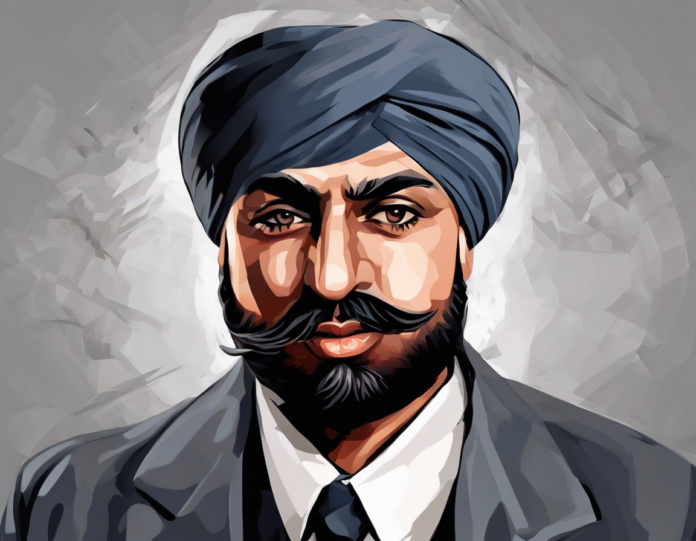Introduction:
Udham Singh, also known as Shaheed-i-Azam Sardar Udham Singh, was a prominent freedom fighter whose name resounds in the annals of Indian history. Born on December 26, 1899, in Sunam, Punjab, Udham Singh’s life was an extraordinary tale of courage, sacrifice, and unwavering commitment to the cause of India’s independence from British colonial rule. His journey from a young orphaned boy to a revolutionary martyr is a story that continues to inspire generations.
Early Life and Influences:
Growing up in a society marred by oppression and injustice, Udham Singh witnessed firsthand the atrocities committed by the British Raj in India. The Jallianwala Bagh massacre of 1919, where hundreds of innocent civilians were gunned down by British troops, left an indelible mark on his impressionable mind. This tragic event fueled his determination to seek vengeance against those responsible for the bloodshed.
The Road to Rebellion:
Udham Singh’s transformation into a revolutionary began with his involvement in various political movements aimed at challenging British supremacy in India. He joined the Ghadar Party, a revolutionary organization formed by Punjabi Indians in the United States, which advocated for the overthrow of British rule through armed struggle. His participation in the Non-Cooperation Movement led by Mahatma Gandhi further solidified his commitment to the cause of independence.
The Assassination of Michael O’Dwyer:
The watershed moment in Udham Singh’s life came on March 13, 1940, when he carried out the assassination of Michael O’Dwyer, the former Lieutenant Governor of the Punjab who had sanctioned the brutal massacre at Jallianwala Bagh. The shooting took place at a public event in London, where Udham Singh avenged the lives lost in Amritsar more than two decades earlier. His act of retribution sent shockwaves across the British Empire and catapulted him to the status of a national hero.
Trial and Execution:
Following his arrest, Udham Singh underwent a widely publicized trial in Britain, where he proudly proclaimed his actions as an act of patriotism and justice. Despite facing the gallows with unwavering resolve, he embraced martyrdom on July 31, 1940, leaving behind a legacy that would endure for eternity.
Legacy and Commemoration:
Udham Singh’s sacrifice did not go in vain, as his actions symbolized the undying spirit of resistance against colonial oppression. His name became synonymous with valor and selfless devotion to the motherland. In India, numerous institutions, monuments, and streets have been dedicated to honoring his memory and legacy. The biopic “Sardar Udham,” starring Vicky Kaushal, further immortalized his story on the silver screen, introducing a new generation to his extraordinary journey.
Lessons from Udham Singh’s Life:
The life of Udham Singh is a testament to the power of individual agency in the face of tyranny and injustice. His unwavering commitment to the cause of freedom serves as a reminder that one person’s actions can spark a revolution and inspire millions to stand up against oppression. Udham Singh’s journey from obscurity to immortality underscores the importance of fearlessness, sacrifice, and perseverance in the pursuit of justice and liberty.
Conclusion:
In honoring the legacy of Udham Singh, we pay tribute to a true patriot and martyr whose life exemplified the highest ideals of bravery and sacrifice. His story serves as a beacon of hope and inspiration for all those who strive for a more just and equitable world. As we reflect on his remarkable journey, let us draw strength from his courage and conviction to continue the fight for a better tomorrow.
Frequently Asked Questions (FAQs)
-
Who was Udham Singh, and why is he considered a hero?
Udham Singh was a prominent Indian freedom fighter known for avenging the Jallianwala Bagh massacre by assassinating Michael O’Dwyer, the former Lieutenant Governor of Punjab. He is regarded as a hero for his unwavering commitment to India’s independence and his courageous act of retribution against British oppression. -
What was the significance of Udham Singh’s assassination of Michael O’Dwyer?
Udham Singh’s assassination of Michael O’Dwyer was a symbolic act of justice aimed at avenging the innocent lives lost in the Jallianwala Bagh massacre. It served as a powerful statement against colonial tyranny and inspired a sense of national pride and unity among Indians. -
How did Udham Singh’s actions impact the freedom struggle in India?
Udham Singh’s actions galvanized the Indian freedom movement and rallied support for the cause of independence. His sacrifice brought international attention to the injustices perpetrated by the British Empire in India and inspired others to join the fight against colonial rule. -
What is the significance of Udham Singh’s legacy in modern India?
Udham Singh’s legacy continues to inspire generations of Indians to uphold the values of courage, sacrifice, and patriotism. His story serves as a reminder of the ongoing struggle for justice and freedom and underscores the importance of standing up against oppression and injustice. -
How has Udham Singh been commemorated in India and around the world?
Udham Singh has been honored through the establishment of monuments, institutions, and streets named after him in India. His story has been immortalized in films, books, and documentaries, ensuring that his legacy remains alive in the collective memory of the nation and the world.




